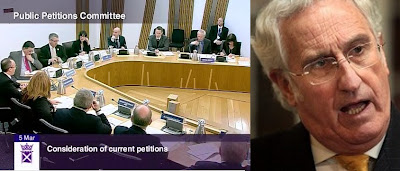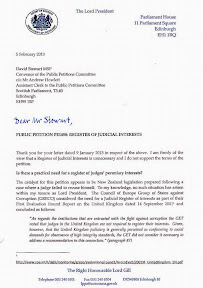 Lord Gill protested against proposal to require judges to declare their interests. SCOTLAND’S Lord President Lord Brian Gill is to be invited to the Scottish Parliament Petitions Committee to explain his ‘robust’ opposition to a proposal put forward in a law journalist’s PUBLIC PETITION calling for a Register of Judicial Interests for all members of Scotland's judiciary.
Lord Gill protested against proposal to require judges to declare their interests. SCOTLAND’S Lord President Lord Brian Gill is to be invited to the Scottish Parliament Petitions Committee to explain his ‘robust’ opposition to a proposal put forward in a law journalist’s PUBLIC PETITION calling for a Register of Judicial Interests for all members of Scotland's judiciary.
Diary of Injustice has previously reported on the deliberations which took place at the Petitions Committee on 5th March 2013, along with exclusive coverage from the Sunday Mail newspaper, here : SILENCE IN COURT : Scotland’s top judge Lord Gill summoned to Parliament over ‘vested interests’ attempt to block Register of Judicial Interests petition.
As the verbatim transcript of the Petitions Committee meeting of 5th March has now been published by the Scottish Parliament, it is reprinted today as a natter of record, and for readers convenience. The full account of the 5th March meeting can also be viewed online here : PPC Official Report 5 March 2013
Petition PE1458: Register of Interests for members of Scotland's judiciary calls for the Scottish Parliament to urge the Scottish Government to create a Register of Pecuniary Interests of Judges Bill (as is currently being considered in New Zealand's Parliament) or to amend present legislation to require all members of the Judiciary in Scotland to submit their interests & hospitality received to a publicly available Register of Interests.
Petition PE1458 Register of Judges Interests 5 March 2013 Scottish Parliament (click image below to watch video footage of Petitions Committee debate)
Transcript of PPC meeting 5th March 2013 : Judiciary (Register of Interests) (PE1458) :
The Convener: The eighth and final current petition is PE1458, by Peter Cherbi, on a register of interests for members of Scotland’s judiciary. Members will have received the clerk’s note and the submissions.
As I am sure other members have, I have looked at this very interesting petition in great detail. Members might be aware that the current position as outlined by the Lord President is that a sheriff or judge who faces a conflict in a case—if, for example, he or she plays golf with the accused or if, as in the case in New Zealand, he or she allegedly owes money to one of the lead defence lawyers, which has triggered one particular issue—is able to recuse themselves, which basically means that they disqualify themselves from presiding in that case.
The Lord President and the Scottish Government have indicated that they have no plans to introduce changes. If they were so minded, the Scottish Government could change the law in this respect—in other words, create the kind of standard register that we, MPs and ministers have to comply with—or the Lord President could introduce administrative changes to the rules but, as I have said, neither is minded to do so.
Interestingly, the petitioner has argued that there is no real evidence on, for example, the number of judges who have declared an interest in a case and recused themselves or on whether any judges are presiding over cases in which they have an interest but have not declared it. He also wonders why, if many other public groups need a register of interests, judges should be any different.
We find ourselves in quite a difficult dilemma.
The people that the petition seeks to change have made it clear that there is not going to be any change. However, as I said earlier, this committee has always had a good tradition of going the extra mile for every single petitioner. Do we need any more information from the Lord President on, for example, the number of judges who have recused themselves and the effectiveness of the system?
We do not actually know that.
There is also a wider issue. Some of the tabloids have reported that, for example, there have been judges with convictions. Future petitions might come to us concerning issues such as whether a judge with a masonic interest has declared it.
There are three areas in which judges already have quite a solid background: the judicial oath; the statement of principles; and the Judiciary and Courts (Scotland) Act 2008. There are some things that judges already have to comply with, which would be set against a registration of interests.
I hope that that is a reasonable summary of the situation.
Jackson Carlaw: When you said that the judge could be playing golf with the accused, convener, I am sure that you did not mean to discriminate. They could be playing darts or five-a-side football or going out clubbing. We should point that out, to be entirely reasonable.
When I first saw the petition, I was not terribly impressed with it, but I am more impressed with it now, as a consequence of the responses that we have received. The student anarchist in me smells the whiff of vested interests closing doors and turning their backs in an effort to shut the matter down.
In fact, the protest was so great that I found myself thinking, “Methinks the Lord resident doth protest too much.”
I would like us to invite the Lord President to give evidence to the committee, if that is within our competence, along with other vested interests who think that we should close the petition, so that we can ask them to justify their position.
Since it is clear that no one else is examining the issue at the moment, it may be that, on behalf of the petitioner, we should ensure that the issue is aired in public rather than just in writing.
The Convener: That is an interesting view. To answer the technical point, it is perfectly competent for us to invite Lord Gill to give evidence.
Chic Brodie: I could not agree more with Jackson Carlaw. The letter from the Lord President says: “The introduction of such a register could also have unintended consequences. Consideration requires to be given to judges’ privacy and freedom from harassment by aggressive media or hostile individuals”.
We could replace “judges” with “politicians”. Why should judges be any different from politicians? I agree that we should invite the Lord President, the Lord Advocate and others to speak to us.
John Wilson: I agree with Jackson Carlaw’s suggestion that we invite Lord Gill to the committee to explain why he has written what he has.
In fairness, the petitioner has responded in a strong manner, and the response to the petitioner would encourage me to write again to the Scottish Government and to the Lord President to seek clarification about how confident they are that the current system is above reproach and that judges and others recuse themselves when they know someone who is appearing before them, either as a solicitor, advocate, Queen’s counsel or an accused person.
It would be extremely useful for the petitioner, this committee and the Parliament to have Lord Gill and others give their account of why they think that there is no need for any action at the present moment.
Angus MacDonald: When I came to the committee this morning, I did not expect the debate to go down this route. However, having heard Jackson Carlaw’s suggestion that Lord Gill and others should appear before the committee, I think that that is an excellent course of action. It would be helpful if we could get further information on the legislation that has been proposed in New Zealand.
The Convener: I think that 10 useful points were set out in New Zealand to weigh up whether it was necessary to introduce any further controls—I would put “controls” in inverted commas.
I suggest that members familiarise themselves with those 10 points before we speak to Lord Gill at any future meeting.
Anne McTaggart: I agree with Jackson Carlaw’s suggestion
Chic Brodie: I know that the petitioner called for a register of judges’ pecuniary interests. However, I am not sure that the investigation should be limited just to that. Perhaps we should consider the issue of a register of judges’ total interests. I do not know whether that would be competent.
The Convener: That is a fair point that we could raise with Lord Gill. However, as I said, I suggest that members examine closely what is happening in New Zealand. The petitioner makes the point that there is more to the situation than what is happening in New Zealand, but I think that that is a useful point to focus on.
Do we agree to continue the petition and to invite the Lord President, and any colleagues that he wishes, to speak to us at a future meeting?
Members indicated agreement.
